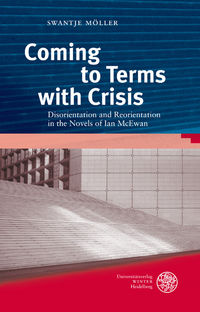
Coming to Terms with Crisis
Disorientation and Reorientation in the Novels of Ian McEwan
1. Auflage, 2011
204 Seiten
ISBN: 978-3-8253-5880-8
Sortiment: Buch
Ausgabe: Gebunden
Fachgebiet: Anglistik/Amerikanistik
Reihe: Anglistische Forschungen, Band: 415
lieferbar: 26.08.2011
Schlagwörter:
Gesellschaft und Selbst /i. d. Literatur, Identität /i. d. Literatur, amerikanische Literatur /McEwan, Ian, Ethik /i. d. Literatur, Kontingenz /i. d. Literatur, Postmoderne /Ethik, Literatur und Ethik, Krisenbewußtsein /i. d. Literatur, McEwan, Ian
This study offers a critical reading of Ian McEwan’s novels by placing them in the discourse on postmodernity and ethics. Starting from the assumption that as human beings we have a fundamental need for ethical orientation which is of particular importance in a postmodern world characterised by contingency and change, this study investigates how the themes of crisis and reorientation are negotiated in McEwan’s novels. Acknowledging the central role of alterity in these novels, the study draws its theoretical framework largely from ethicists in the Levinasian tradition who, rather than arguing for normative codes of behaviour or notions of virtue, understand ethics in terms of the interactive encounters between individuals. This study therefore aims to contribute not only to the growing body of scholarship on Ian McEwan and, to a certain extent, to reorient our understanding of his writing, but also to take part in the ongoing debate about the relationship between literature and ethics.
""
Catherine Bernard in: Études anglaises, 67/3 (2014), 381f
""
Anja Müller-Wood in: Anglistik, 24.2 (2013), 215ff
""
in: Reference and Research Book News, Vol. 26., no. 6, Dec. 2011, 180




